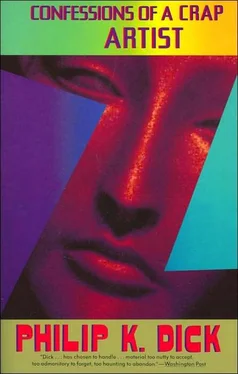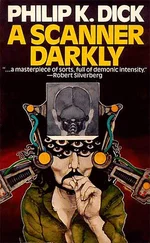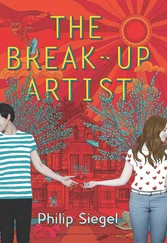“Anyhow,” Fay said at last, after he had said nothing but still remained, “you were too emotionally involved with it. It’s not healthy to be that involved with an animal.”
“Then you did get rid of it on purpose!” he said loudly.
“No I didn’t. I’m just commenting. Maybe it’s better that it ran off. This proves you were too deeply involved, on you wouldn’t be carrying on so. My god, it was just a cat. You’ve got a wife and two children and you’re carrying on about a cat.” The sharp contempt in her voice made him shiver. It was her most effective tone, full of the weight of authority; it recalled to him his teachers in school, his mother, the whole pack of them.
Unable to carry it any further he turned and walked off, to pick up the evening paper.
There in the post office, recalling his lost cat, he felt a terrible loneliness and sense of deprivation. After buying his stamps he set off, back to his parked car, recognizing that the failure on his part to make contact with the boy and girl had linked itself in his mind with the loss of the cat. The breakdown of relationships between living things… the gulf between him and other living things. Why? he asked himself as he got into the car.
Fuck it all, he thought with bitterness.
He drove reflectively, doing a bad job of getting the car from the lot and onto the street. And then, just past the Mayfair Market, he saw propped up against the loading dock two racing bikes. Their bikes—they had gone into the Mayfair Market. Without reflection he brought the car to the curb, leaped out, and hurried across the street and up onto the sidewalk and through the open door and into the dark, cool old wooden market building, among the vegetables and displays of wine bottles and magazine racks.
Toward the back of the store the boy and girl lingered together at the shelf of canned vegetables. He hurried toward them; he had to approach them, or have the weight of conscience on him for months. Fay would never forgive him—impelled toward them, he arrived to confront them as they filled a wire basket with cans and packages and a loaf of bread.
“Hey,” he said, his ears ned and burning. Astonished in a controlled manner, they turned toward him. “Listen,” he said, plucking at his belt buckle and staring down, then back up at them. “My wife and I noticed you yesterday—or the other day, I mean. We live up here, at Drake’s Landing, about five miles down the road around Paper Mill Creek, past Inverness Park. My wife’s up at the house dying for company.” He added, “We’ve got a horse if you like to ride. How about dropping by and chewing the fat? Could you be talked into staying for dinner?”
Wordlessly, the boy and girl exchanged glances. As he stood there, they communicated silently between them and came to a conclusion.
“We just recently moved in up here,” the girl said in a soft, low voice.
“You’re newly weds?” Charley asked.
They nodded. Both of them seemed shy and reserved, but glad that he had approached them.
“It’s hard to get to know people around here,” he said to them, feeling immensely pleased with himself for having made the contact with them; he had done it, been successful. Fay would be filled with respect. “You have a car?” he said. “Oh that’s right—you’re on bikes. We noticed the bikes.” He heard himself chuckle. “Well, we can toss them in the back of the car.”
The boy and girl finished their shopping with much exacting deliberation. Charley stood off self-consciously to one side, smoking a cigarette and glancing around him.
Presently the three of them were walking toward the bikes, and then the car.
The boy’s name was Nat Anteil. His wife’s was Gwen. During the morning Nat worked for a small, modern real estate firm in Mill Valley and in the afternoon he drove back up here to Point Reyes and spent his time studying; he was in his second year of a college extension course mailed out by the University of Chicago. When he got finished, he explained, he would have a BA in history.
“What are you going to do with that?” Charley asked.
With some shyness, Nat said, “Maybe go on and teach.”
Gwen said, “It’s more for his own edification, not to make money from. We both want to be aware of what’s happening in the world.”
“I’m in the iron business,” Charley said. “But don’t let that fool you. My wife’s the one who brought culture to this area; she got all the cultural affairs going, here.”
“I see,” Gwen said, nodding.
“Such as the modern dance group,” Charley said. “And I’m a member of the Inverness Yacht Club. We own a hi-fl—mounted right in the wall. We had the house built ourselves; we got our own architect. God, it set me back almost forty thousand dollars. Wait’ll you see it; it’s only four years old. We’ve got ten acres.” As they drove he told them all about the sheep and the collie, pouring out his words faster and faster, unable to stop.
The Anteils listened raptly.
“We can play badminton out back,” Charley said, as they came within sight of the cypress trees. “Wait’ll you see my wife. She’s the best god damn good-looking woman up here. They’re all a bunch of dogs compared to her. Why hell, even after having two kids she’s still a size twelve.” That sounded right to him; or was it a size sixteen? “She really keeps her figure,” he said, as he turned from the road into the driveway.
“What lovely big trees,” Gwen said, staring out at the cypress. “Do they belong to you?” To her husband she said excitedly, “Nat—look at that collie. It’s blue.”
“That dog’s worth five hundred bucks,” Charley said, delighted at their response. He saw them straining to see the house, making out the sight of the horse as it cropped grass out in the field. “Come on,” he said, opening the door for them. “She’ll sure be pleased to see you.” As the three of them walked toward the house he explained, in disjointed phrases, how Fay had felt about them and how badly they both had wanted to meet them.
When I saw Charley coming up the path from the car with those two delightful apparitions I could hardly believe my eyes. It was the greatest present he could have given me, and I completely adored him for it. Putting down my book I ran into my bedroom and took a look at myself in the mirror. Why at this time had that little queer down in Fairfax chosen to cut my hair on one side shorter than on the other? From my closet I grabbed out my blue-striped shirt and began buttoning it over my halter and tucking it into my shorts.
“Honey!” Charley called from the living room. “Hey, look who I talked into coming home with me!”
At the mirror I put on lipstick, blotted it, brushed my hair in back, put away my dark glasses which I had worn into the house from outside, and then I hurried into the living room.
There they stood, shyly, peeking around at the bookcases and the record shelves, like a pair of children in a historic shrine—the way I had felt when we visited the mission over in Sonoma and I found myself standing in the old chapel, with the straw sticking out of the adobe where it had broken away. I was glad that Mrs. Mendini had seen fit to do a good job scrubbing the floor and dusting; at least the house looked good, even if I was a trifle messy.
I smiled at them and they smiled back. This is historic, I thought. Like Lewis and Clarke meeting. Or Gilbert and Sullivan. “Hi,” I said to them.
The girl said, “What a lovely house.”
“Thank you,” I said. Going toward the bar I said, “What would you like to drink?” I opened the liquor cabinet and got out the bottle of gin and the vermouth. Feeling nervous—for some reason—I found myself spilling the gin as I poured it into the mixer. “I’m Fay Hume,” I said. “What are your names? Are you married or are you brother and sister? I can’t wait to find out; I have to know.”
Читать дальше










